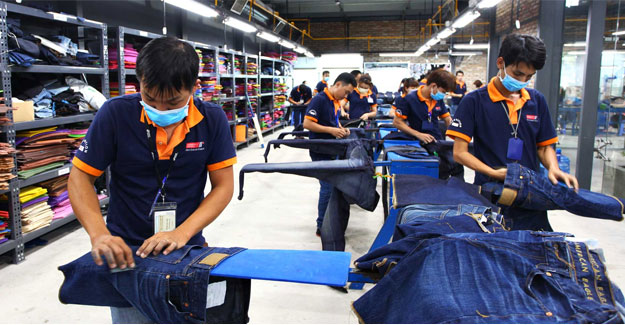
Vietnam Apparel Industry More Competitive Than Bangladesh: Report
Vietnam's fashion industry on the ten leading indices logs at least one score ahead of Bangladesh, while the gaps are 1.5 and 2 respectively on sustainability and political stability. In terms of product quality, lead time, and sustainability, Bangladesh's clothing sector is not as good as its neck-and-neck market peer Vietnam, according to a recent World Trade Organisation (WTO) competitiveness report, as Dhaka scores remarkably lower than Hanoi on ten indices out of a total of twelve. A comparison of lead times reveals that Vietnam is better able in sourcing raw materials, according to the report, and also can release the imported consignment at its ports within 24 hours. In contrast, Bangladesh takes 48 hours to one month to release raw material imports for the apparel industry, said local garment factory owners. They said Vietnamese workers are 10%-15% more efficient in manufacturing, while the country can deliver the final product to European buyers 10-15 days earlier than Bangladesh. Then comes the shipment time. Vietnam directly sends the products to the buyers from its seaports, but Bangladesh cannot. Due to the unavailability of a deep-sea port, feeder vessels have to take the products to countries such as Singapore and Sri Lanka, where the products are transferred to mother vessels for shipment to Europe and the USA. Other major gauges of the recent WTO report, titled, "Textiles and clothing in Asian graduating LDCs: Challenges and options" – prepared after surveying at least 150 exporters and 30 global brands and retailers – are ability to create value-added products, innovation, efficiency, flexibility of order quantity, financial stability and political stability. Vietnam's fashion industry on the ten leading indices logs at least one score ahead of Bangladesh, while the gaps are 1.5 and 2 respectively on sustainability and political stability, shows the report. The report was prepared with data contributed by several UN agencies including the United Nations Conference on Trade and Development (UNCTAD). Only on two indicators – price and tariff advantage, Bangladesh is ahead of Vietnam and China thanks to duty-free access to key global markets and local cheap labour. The country is a little ahead in some indicators than three other least developed countries in Asia including Cambodia, Laos and Nepal. However, Fazlee Shamim Ehsan, vice-president at the BKMEA, said he does not agree with all the indicators showing Bangladesh apparel behind Vietnam. "None is supposed to be ahead of us in terms of flexibility of order quantity. We accept orders so flexibly that buyers can take several thousand pieces to only a few hundred pieces from us," he claimed. The BKMEA vice-president also defended the quality of made-in-Bangladesh products by saying, "We manufacture products as buyers want. Since Bangladesh is capable of satisfying the brands with the quality, the country is getting increasing work orders." He, however, agreed that Bangladesh has a lot to improve in terms of higher value addition. Faruque Hassan, president at the Bangladesh Garment Manufacturers and Exporters Association (BGMEA), too said the report in some cases surprisingly underrated the progress made by Bangladesh garment industry over the past decade. "The report mentions environmental compliance related risks as a downside for sourcing from Bangladesh, while the industry has made a huge stride to transform workplace safety, workers' wellbeing and environmental sustainability. The rating seems to be inappropriate," he noted. Bangladesh will no longer be entitled for duty-free market access after 2029, as the country will graduate from least developed country club in 2026 and its export will enjoy facility extension for another three years until 2029. Noted economist Dr Abdur Razzaque, who wrote the report, said Vietnam and Cambodia have strong presence of foreign direct investment (FDI) in their apparel sectors that help them establish improved standards and bargaining power. Moreover, Vietnam has a number of FTAs that help propel its RMG exports. However, Bangladesh so far has the lone bilateral preferential trade agreement with neighbouring Bhutan. According to the report, Bangladesh may concede a loss of US$ 5.37 billion due to the impact of LDC graduation on export. Still there will be orders The WTO report says fashion brands and retailers adopt diverse sourcing considerations, including cost, speed to market, flexibility, agility and compliance risks. With China and Vietnam as critical sourcing bases, fashion brands mostly see the least developed countries Bangladesh, Cambodia, Laos and Nepal as part of their diverse sourcing locations. According to the report, Turkey is another major sourcing destination for European Union-based fashion companies, while EU-based buyers source fewer complex products (such as dresses and outerwear) from Bangladesh, Cambodia, Laos and Nepal due to their limited production capacities. The report mentions, fashion brands and retailers may still find it attractive to source from Bangladesh, Cambodia, Laos and Nepal after their LDC graduation. Major brands and retailers believe LDC graduation may only modestly affect their sourcing. It also said that in the next three to five years, they will increase their sourcing from Bangladesh and Cambodia. Commerce Minister Tipu Munshi told The Business Standard that Bangladesh will try to avail the duty-free export facility until 2031 – five years after the LDC graduation. "Besides, we are looking for PTA and FTA agreemenats with several countries this year," the minister commented. While there may be some hardships, some issues with adjusting to a world without GSP benefits, the Bangladeshi RMG industry has been learning lessons from its competitors, investing in the latest technologies, and environmental and worker safety processes and standards. Even without the GSP benefits, Bangladeshi RMG export sector will be a force to reckon with. It’s time to graduate to a more complex product mix.
Textile Excellence
If you wish to Subscribe to Textile Excellence Print Edition, kindly fill in the below form and we shall get back to you with details.








